August 8, 2023
By Emily Ayshford
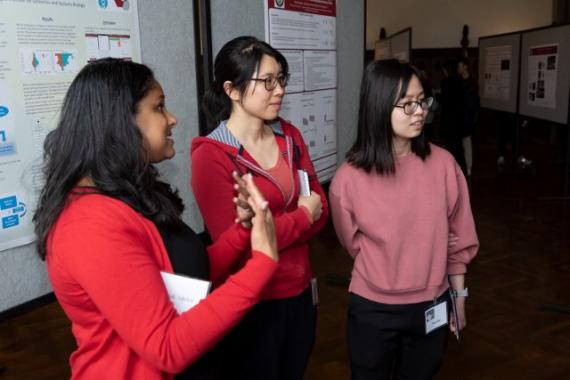 Public policy professor Anjali Adukia shares her research with Mind Bytes attendees, photo credit Alan Klehr
Public policy professor Anjali Adukia shares her research with Mind Bytes attendees, photo credit Alan Klehr
The impact of computing on science and culture is hard to overstate. A few years ago, we were propelled into the Exascale era with the launch of the Frontier machine at Oak Ridge National Laboratory. More recently, a chatbot, ChatGPT, showed the world the power of generative AI.
To celebrate more than 10 years of enabling research and scientific achievements grounded in high-performance computing, University of Chicago faculty, staff, students, and other guests came together on May 2nd for the Research Computing Center’s (RCC) annual Mind Bytes expo and symposium.
This year’s expo — with a theme of Computing, Data, and Beyond: Impact on our World — featured experts commenting on the state of high-performance computing and showcased several research breakthroughs made possible by the RCC’s resources and services.
The RCC currently has more than 8,000 users, including more than 700 faculty members. The RCC has continued to innovate and offer new services, including dedicated computational resources for climate research, new services to support quantum research, and expanded commercial cloud resources.
“What we do at the Research Computing Center is driven by the needs of faculty,” said H. Birali Runesha, Director of the RCC. “To support discovery and innovation, the RCC enables faculty and researchers to pilot and explore big ideas and high-risk and experimental projects.”
Simulations for research at all levels
In fact, many scientific research innovations at UChicago today rely on simulations and models so complex that they can only be run on high-performance computers. At the expo, four UChicago faculty members offered quick snapshots of how the RCC supports their research.
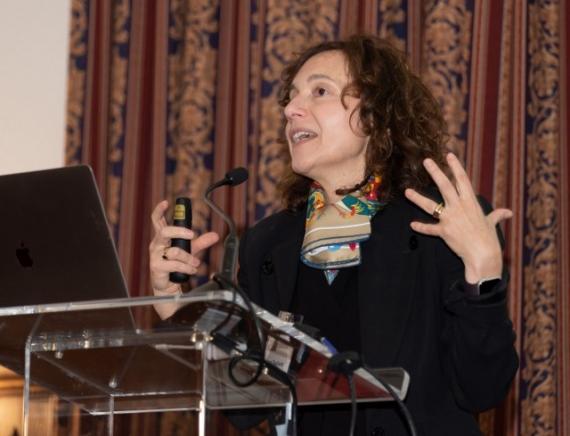 Chemistry professor Laura Gagliardi, photo credit Alan Klehr
Chemistry professor Laura Gagliardi, photo credit Alan Klehr
For chemistry professor Laura Gagliardi, helping to make water more available in dry climates requires not only innovative engineering — it requires complex simulations to understand atomic structures of materials. Gagliardi is part of a team working to create a “sponge” out of a material called metal-organic frameworks. A device made from this material can be placed in a desert, where it adsorbs water from the air and then releases it to be used as drinking water. Gagliardi’s simulations on the RCC’s high-performance computers allowed her and her team to better understand the material, predict how it could work better, and ultimately improve the device to collect more water.
 Psychology professor Jai Yu, photo credit Alan Klehr
Psychology professor Jai Yu, photo credit Alan Klehr
Psychology professor Jai Yu uses the RCC’s resources in his research to better understand how animals make decisions. His research, which involves recording neural activity of rats, video data, and sensor data creates terabytes of data. Working with the RCC, his team created a data storage pipeline that allows efficient data processing, giving team members access to data from anywhere, any time. “This really allows us to efficiently work together to solve large problems that we can’t really do by ourselves,” he said.
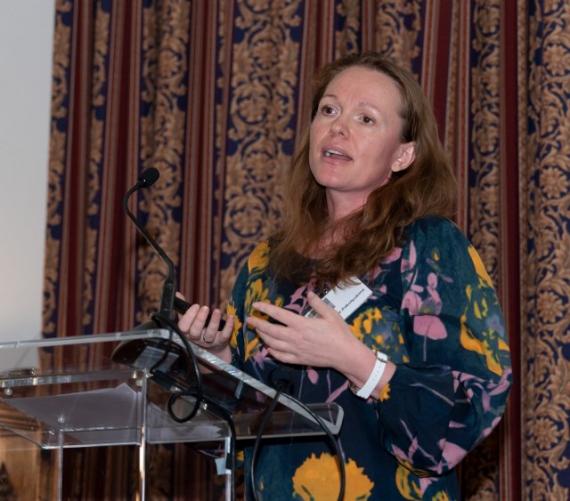 Professor of accounting Anastasia Zakolyukina, photo credit Alan Klehr
Professor of accounting Anastasia Zakolyukina, photo credit Alan Klehr
Researchers like Anastasia Zakolyukina, professor of accounting, use the RCC’s computers to take on a complex topic: financial fraud. To try to find undetected financial fraud, she uses full solution estimation methods. But these methods have a high computational cost. Working with the RCC, she was able to solve previously unsolvable problems, leading to insights into how widespread financial fraud is. She found that 60 percent of firms engaged in some level of “cooking the books.”
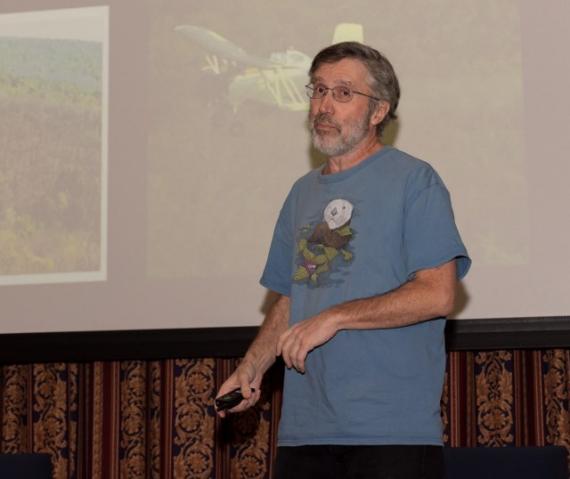 Professor of ecology and evolution Gregory Dwyer, photo credit Alan Klehr
Professor of ecology and evolution Gregory Dwyer, photo credit Alan Klehr
High-performance computing can also help show the hidden costs of climate change. Gregory Dwyer, professor of ecology and evolution, used the RCC’s resources to show the effects of weather patterns on the spongy moth (previously known as the gypsy moth). This invasive pest defoliates vast areas of forests, but a deadly fungal pathogen can help keep the moth in check. During wetter, cooler years, the fungus proliferates, killing the spongy moths before they can do widespread damage. In collaboration with Argonne National Laboratory, Dwyer ran simulations on the effect of the pathogen if the weather becomes hotter and drier. The simulations showed that the fungal pathogen would be less prevalent, leading to more spongy moths and more defoliation.
An explosion of supercomputers
High-performance computing is so important to science that the Department of Energy invested $4 billion over 7 years in its Exascale Computing Project, which led to the design and construction of three new supercomputers. In his keynote talk at the expo, Professor Jack Dongarra laid out the potential innovations — and drawbacks — enabled by these supercomputers.
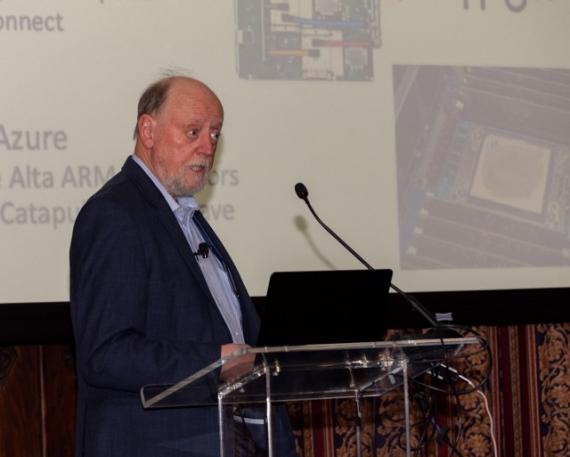 Professor Jack Dongarra, photo credit Alan Klehr
Professor Jack Dongarra, photo credit Alan Klehr
Jack Dongarra, an emeritus professor at the University of Tennessee and a distinguished research staff member at Oak Ridge National Laboratory, received the prestigious Turing Award in 2021 for his pioneering contributions that enabled high-performance computational software to keep pace with exponential hardware improvements.
His work developing software library LINPACK ultimately led him to help create the TOP500 list of top supercomputers. Currently, Oak Ridge National Laboratory’s Frontier supercomputer is the fastest in the world, with a performance of 1.1 exaflops. (An exaflop is a billion-billion floating point operations per second.) If each person on Earth did one calculation per second, it would take 4 years to do what an exascale computer can do in 1 second.
That’s a far cry from 30 years ago, when the fastest computers in the world were much less powerful than our laptops our today. US supercomputers today, including Frontier and two more that will soon come online, are highly parallel computing systems, use distributed memory, and are aimed at simulating and solving problems in energy, national security, and earth and space science.
“The biggest machines can do the best science,” he said. It’s a worldwide competition — two of the fastest computers in the world are in China, and there are rumors that they have two more supercomputers already up and running.
But today’s computing ecosystem is “in a state of flux,” Dongarra said. Supercomputers use commodity processors and accelerators, and because of communication issues within supercomputers, all only run at fraction of their potential. Perhaps these systems should have specially designed processors and accelerators that were made for scientific applications, Dongarra said.
“Maybe we should be thinking along those lines,” he said.
Creating responsible AI
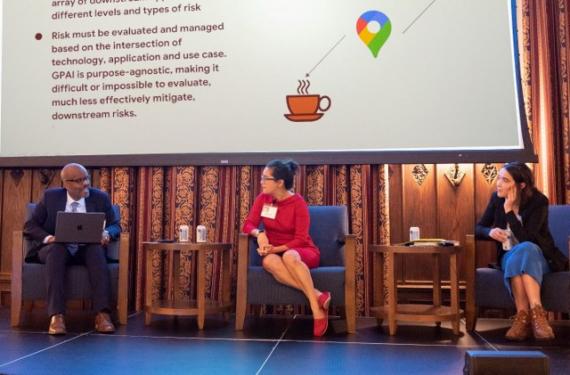 Birali Runesha, Addie Cooke, and Jessica Yeats, photo credit Alan Klehr
Birali Runesha, Addie Cooke, and Jessica Yeats, photo credit Alan Klehr
But the explosion of computing, especially within AI and machine learning, has led to more discussions around understanding and regulating such technologies. When ChatGPT was unveiled in 2022, people around the world became aware of generative AI capabilities (and potential malfunctions). At the expo, two leaders in the field — Addie Cooke, cloud AI public policy lead at Google, and Jessica Yeats, principal data scientist, autonomous vehicles at NVIDIA — discussed the policy and ethics around generative AI.
Google has created AI principles to guide its work in the area, Cooke said, but once a product is out in the world, it can be difficult to control how it is used. “ChatGPT can be used to plan your garden box or it can be used to generate malicious code,” Cooke said. “How do you allow one but disallow the other?”
“To create responsible products, AI developers must contend with bias in algorithms and pursue the concept of truth”, Yeats said. That can be done by having a human in the loop and by increasing transparency.
Both compared generative AI to the nuclear arms race: with regulations, guardrails, and global alignment, we have had nuclear peace, so a problem like generative AI that can seem unsolvable and out of control can be solved, they argued.
Quoting Google CEO Sundar Pichai, Cooke said, “Don’t count humans out. They’ve always been able to run faster than technology.”
Mind Bytes 2023 Poster Awards
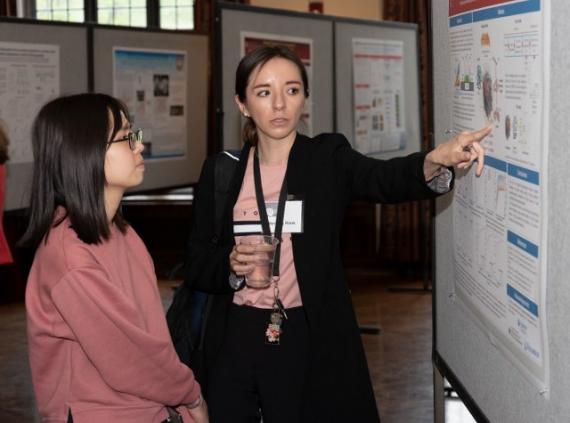 Researcher explains her work, photo credit Alan Klehr
Researcher explains her work, photo credit Alan Klehr
Each year, a highlight of the event, is the research posters. Researchers present posters reflecting the various ways the RCC’s high-end computing resources are used in support of their work. Awards are given for the top poster in 4 categories: Data Science, Computing, Data Visualization, and Judges Choice. This year’s winners were:
Data Science category
Winning poster: Predicting Thermophysical Properties of Polyethylene Mixtures
Maria Ley Flores, Riccardo Alessandri, Juan Jose De Pablo
Computing category
Winning poster: Rodent Movement Pattern Classification
Bojun Feng, Jai Yu, EMK Laboratory
Data Visualization category
Winning poster: What we teach about race and gender: representation in images and text of children’s books.
Anjali Adukia, Alex Eble, Emileigh Harrison, Teodora Szasz
Judges Choice category
Winning poster: Limited Diffusion of Scientific Knowledge Forecasts Collapse
Donghyun Kang, Robert S. Danziger, Jalees Rehman, James Evans